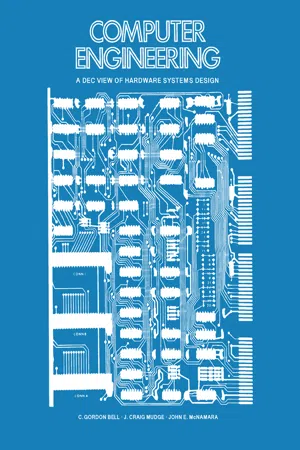Technology & Engineering
Computer Engineering
Computer engineering is a field that combines principles from both computer science and electrical engineering to design and develop computer systems and hardware. It involves the study of computer architecture, digital logic, software engineering, and computer networks. Computer engineers work on developing new technologies and improving existing ones to meet the demands of the modern world.
Written by Perlego with AI-assistance
Related key terms
1 of 5
6 Key excerpts on "Computer Engineering"
- eBook - PDF
- Bonnie A. Osif(Author)
- 2016(Publication Date)
- CRC Press(Publisher)
Engineers.(IEEE).Computer.Society,.provides.us.with.a.more.detailed.working.definition.as.out-lined.in.its. Curriculum Guidelines for Undergraduate Degree Programs . in . Computer Engineering . published.in.December.2004: Computer.engineering.as.an.academic.field.encompasses.the.broad.areas.of.computer.science.and.elec-trical.engineering . .Computer.engineering.is.defined.in.this.report.as.follows: Computer.engineering.is.a.discipline.that.embodies.the.science.and.technology.of.design,.construc-tion,.implementation,.and.maintenance.of.software.and.hardware.components.of.modern.computing. systems.and.computer-controlled.equipment . .Computer.engineering.has.traditionally.been.viewed.as. a.combination.of.both.computer.science.(CS).and.electrical.engineering.(EE).http://www .eng.auburn. edu/ece/CCCE/CCCE-FinalReport-2004Dec12.pdf .(accessed.October,.22,.2010) . Finally,. the. Web. page. of. Trinity. College. Dublin. provides. us. more. context. on. the. role. of. the. computer.engineer: A. computer. engineer. needs. excellent. problem-solving. skills,. a. good. theoretical. grounding. in. the. fundamentals.of.engineering,.and.the.practical.skills.to.put.theory.into.practice . .Computer.engineers. may.design.computer.hardware,.write.computer.programs,.integrate.the.various.subsystems.together. or.do.all.three . .Computer.engineers.need.good.management.skills.as.they.often.get.quickly.promoted. to.project.manager-type.positions . .Furthermore,.computer.engineers.need.good.people.skills,.as.they. have.to.sell.their.ideas.to.other.engineers,.other.professionals,.and.members.of.the.public . Another.way.to.consider.this.is.that.the.computer.engineer’s.primary.goal.is.to.implement.theories. developed. by. computer. scientists. to. solve. practical. problems. and. create. viable. systems . . This. com-parison. is. analogous. to. science. and. engineering. in. general—science. often. provides. results. that. are. significant.to.engineering . - eBook - ePub
- DeLean Tolbert Smith, Aishwary Pawar, Nicole P. Pitterson, Debra-Ann C. Butler(Authors)
- 2022(Publication Date)
- Visible Ink Press(Publisher)
Computer Engineering focuses on the practical use of computers. Computer Engineering combines electrical and electronic engineering with computer science. A computer engineer can design and develop computer systems and devices. For example, they may design, test, and improve computer hardware, such as computer circuit boards, and computer software, such as operating systems (i.e., macOS and Windows).Computer engineers develop both hardware and software, combining knowledge of computer science and electrical engineering.DID YOU KNOW?What is computer architecture?Computer architecture is the process of selecting the hardware components to build a computer or system. A computer engineer must consider the technology available, the applications and domains, and the goals. Some applications and domains include desktop computing, servers, cell phones, embedded systems in automobiles and planes, and video game consoles.What does it mean for a computer to execute a task?Execution is when the hardware follows the instructions of a specific program or code.What is a database?A database is a digital storage system that allows a user to organize, search, and retrieve data. An example of a database is an online clothing business that keeps track of product inventory and customer information. This might include how frequently a customer visits the website, where the customer is from, and what items they look at and/or purchase.How are databases used by computer scientists?Computer scientists created databases for streaming services like Netflix and Disney+ to keep track of what the viewer watches and what shows are available to stream so that they can make recommendations on what to watch next. With live gaming across the world on different platforms, a large amount of user data is created. Players’ information must be gathered and given to other players on demand. Computer scientists also create and manage databases in finance, health care, cloud storage, sports, government, social media, and weather. - eBook - PDF
- Paul H. Wright(Author)
- 2012(Publication Date)
- Wiley(Publisher)
It is a relatively new and rapidly growing engineering discipline with extraordinary challenges and opportunities. Since the invention of the transistor in 1947, technological advances in Computer Engineering have been astounding. Today, it is possible to integrate more than 100 million transistors in a single integrated circuit chip. At the same time, the switching speed of transistors has increased more than 10,000 fold, and it is now possible to design chips that operate at more 26 CHAPTER 2/DEFINITION OF ENGINEERING than one billion operations per second. This rapid improvement in computer technology has challenged computer engineers: (1) to invent hardware and software design, and the tools to develop these integrated circuit chips and (2) to imagine, design, and verify systems containing these chips. Rapid advances in computer technology, resulting in ever smaller, less costly, high-performance computers, have resulted in a vast number of applications containing embedded computers as elements. These range from highly complex communications systems to biomedical imaging devices, sophisticated con- sumer products, and household appliances. 2.5 MECHANICAL ENGINEERING One of the oldest and broadest areas of engineering activity, mechanical engi- neering, is concerned with machinery, power, and manufacturing or produc- tion methods. Mechanical engineers design and manufacture machine tools—the machines that make machines—and machinery and equipment for all branches of industry. For example, they design turbines; printing presses; earth-moving machinery; food processors; air conditioning and refrigeration systems; artificial hearts and limbs; and engines for aircraft, diesel locomo- tives, automobiles and trucks, and public transportation vehicles. Their machines move and lift loads, transport people and goods, and produce energy and convert it to other forms. - eBook - PDF
Computer Engineering
A DEC View of Hardware Systems Design
- C. Gordon Bell, J. Craig Mudge, John E. McNamara(Authors)
- 2014(Publication Date)
- Digital Press(Publisher)
1 Seven Views of Computer Systems C. GORDON BELL, J. CRAIG MUDGE, and JOHN E. McNAMARA A computer is determined by many factors, including architecture, structural properties, the technological environment, and the human as-pects of the environment in which it was de-signed and built. In this book various authors reflect on these factors for a wide range of DEC computers - their goals, their architectures, their various implementations and realizations, and occasionally on the people who designed them. Computer Engineering is the complete set of activities, including the use of taxonomies, the-ories, models, and heuristics, associated with the design and construction of computers. It is like other engineering, and the definition that Richard Hamming (then at Bell Laboratories) gave is especially appropriate: engineers first turn to science for answers and help, then to mathematics for models and intuition, and fi-nally to the seat of their pants. In the few decades since computers were first conceived and built, Computer Engineering has come from a set of design activities that were mostly seat-of-the-pants based to a point where some parts are quite well understood and based on good models and rules of thumb, such as technology models, and other parts are com-pletely understood and employ useful theories such as circuit minimization. In this chapter, seven views are presented that the authors have found useful in thinking about computers and the process that molds their form and function. They are intentionally inde-pendent; each is a different way of looking at a computer. A computer scientist or mathemati-cian sees a computer as levels-of-interpreters. An engineer sees the computer on a structural basis, with particular emphasis on the logic de-sign of the structure. The view most often taken by a buyer is a marketplace view. While these people each favor a particular view of com-puters, each typically understands certain as-pects of the other views. - eBook - PDF
Software Engineering Education
Proceedings of the IFIP WG3.4/SEARCC (SRIG on Education and Training) Working Conference, Hong Kong, 28 September - 2 October, 1993
- B.Z. Barta, S.L. Hung, K.R. Cox(Authors)
- 2013(Publication Date)
- North Holland(Publisher)
In software engineering courses the engineering ethos of the course is not only a crucial part of the educational process but also fundamental to the obtaining of accreditation by the professional bodies. Software engineering has often been defined as the application of the principles of engineering to the production of software. It is essential that software engineering students are able to synthesise, the attitudes and practices other than those of computing, particularly those related to engineering in the business world. The basic difference between the education of software engineers and computer scientists lies within the educational process not necessarily within the educational product. The educational process for software engineers should be founded within 54 engineering, the educational product is founded within computing. 'Software engineering and computing engineering have an extremely important and nice aspect to them, namely that people want to work on things that meet other people's needs. They are not interested in working on abstractions entirely, they want to make an impact on the world. This is the real strength of computing today, and it is the essence of engineering.' David[8] REFERENCES 1. Perlis, Software Engineering Education. Software Engineering Techniques, NATO Science Committee, April 1970. 2. Needham and Aron, Software Engineering and Computer Science. Software Engineering Techniques, NATO Science Committee, 1970. 3. Influences of the Alvey software Engineering Programme on Undergraduate Courses in the UK. BCS, 1988. 4. Conway, Dunn, and Hooper, BCS and FEE accreditation of software engineering courses. Software Engineering Journal, July 1989. 5. Undergraduate Software Engineering Curricula. BCS, IEE, 1989 6. Software - a vital key to UK Competitiveness. Report by the Cabinet Office Advisory Council for Applied Research and development (ACARD), HMSO 1986. 7. Lee, Some Initial Thoughts on a Software Engineering Curriculum. - eBook - PDF
- Lokesh Pandey(Author)
- 2023(Publication Date)
- Arcler Press(Publisher)
APPLICATIONS OF ENGINEERING ACROSS VARIOUS FIELDS CHAPTER7 CONTENTS 7.1. Introduction .................................................................................... 188 7.2. Types of Engineering ....................................................................... 188 7.3. Mechanical Engineering ................................................................. 197 7.4. Electrical Engineering ..................................................................... 205 7.5. Computer Science and it Engineering ............................................. 212 7.6. Application of Computer Science and it Engineering....................... 215 7.7. Conclusion ..................................................................................... 223 References ............................................................................................. 225 The Basics of Engineering 188 To develop, design, and analyze solutions engineering is a profession in which people apply scientific theory. Engineering consists of major basic branches which all have numerous subdisciplines in general. Civil, chemical, software, mechanical, electrical, and industrial are the major branches of engineering. To solve problems engineering is the application of science and mathematics. For scientific discoveries engineers figure out how things work and find practical uses. For innovations that advance the human condition, scientists, and inventors often get the credit, but in making those innovations available to the world it is engineers who are instrumental. 7.1. INTRODUCTION Much of the modern society depends on engineered artifacts to function, but many members of modern society are not aware of the engineering techniques and practices that have developed the technology and infrastructure. Engineers’ designs and creations are iPods, cell phones, airplanes, bridges, buildings, vehicles, computers, etc.
Index pages curate the most relevant extracts from our library of academic textbooks. They’ve been created using an in-house natural language model (NLM), each adding context and meaning to key research topics.





